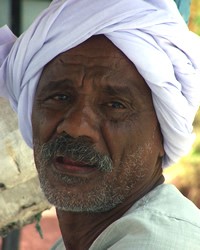The Saidi Arabs originate from Upper Egypt and are known for their unique dialect and cultural practices. The Saidi people have developed a distinct ethnic identity, primarily due to the isolation of the upper Egyptian region, which has resulted in less foreign influence and more conservative attitudes. The Nile valley from which they originate is often described as rural and arid, which has resulted in a greater preservation of the nation's ancient Egyptian and Arabic heritage.The language itself is a distinct dialect of Arabic similar to other Egyptian Arabic dialects. While intelligible to other Egyptians, the Saidi dialect is distinct from traditional Arabic in both pronunciation and vocabulary.A large number of Saidi Arabs have migrated from the Upper Egyptian region to escape poverty and find better opportunities in bigger cities. In recent years, some Saidi Arabs have migrated to Greece, often as refugees or economic migrants. They tend to form close-knit communities in order to maintain their cultural identity and language.
Saidi Arabs living in Greece typically fill positions in the manual labor and service industries. They maintain their traditional values and family heritage, observing cultural celebrations and ceremonies, and speaking Saidi Arabic at home. Saidi cultural expressions can be seen in Greece today, including traditional dances, weddings, and tahtib, a form of stick fighting.
The Saidi Arabs living in Greece are largely Sunni Muslims. They are deeply religious and practice Islam faithfully even when living in a foreign land. There is also a small minority who identify as Christians. Many of these belong to the Coptic Orthodox Church, which originated in Egypt and has similarities to its Greek Orthodox neighbors.
Many Saidi Arabs living in Greece are there to escape poverty. They often face discrimination because of their economic challenges and cultural differences. There are Arabic Bibles and Christian resources available; however, resources in the Saidi dialect are rare. Literacy rates are also a challenge, making gospel resources less accessible.
Pray for the Saidi Arabs in Greece to encounter Jesus through relationships, dreams, and the scriptures.Pray for the removal of barriers that hinder Saidi Arabs from hearing the gospel in a meaningful way.Pray for Saidi laborers for the harvest, local believers being mobilized to reach their own people.Pray for a sustainable movement to Christ among the Saidi and revival within the existing Saidi church.
Scripture Prayers for the Arab, Saidi in Greece.
Baker, Raymond William, Holt, Peter M., Little, Donald P., Smith, Charles Gordon, Goldschmidt, Arthur Eduard, Hopwood, Derek. "Egypt". Encyclopedia Britannica, 22 Sep. 2025, https://www.britannica.com/place/Egypt. Accessed 23 September 2025.Catherine Miller. Between Myth and Reality: the Construction of a Saidi identity. N. Hopkins &R. Saad. Upper Egypt, Identity and Change„ American University of Cairo Press, pp.25-54, 2004.halshs-00150403Eberhard, David M., et al. “Arabic, Saidi Language (AEC) – L1 & L2 Speakers, Status, Map, Endangered Level & Official Use | Ethnologue Free.” Ethnologue, 2025, www.ethnologue.com/language/aec/.“Saidi Arab.” Prayercast, 23 July 2024, prayercast.com/prayer-topic/saidi-arab/.
| Profile Source: Joshua Project |










